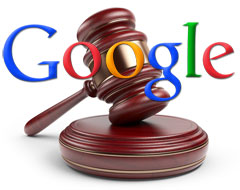Google Agrees To Settle Lawsuit Over Passing Search Queries To Third Parties
Google has agreed to settle a class-action lawsuit that stems from two searchers accusing the company of sharing their search queries with third parties without user content or knowledge. As part of the settlement, Google has agreed to pay $8.5 million into a settlement fund, with that money going to seven groups/organizations on the condition […]
 Google has agreed to settle a class-action lawsuit that stems from two searchers accusing the company of sharing their search queries with third parties without user content or knowledge.
Google has agreed to settle a class-action lawsuit that stems from two searchers accusing the company of sharing their search queries with third parties without user content or knowledge.
As part of the settlement, Google has agreed to pay $8.5 million into a settlement fund, with that money going to seven groups/organizations on the condition that they agree to use the money for public education and/or research related to protecting online privacy.
In October 2010, Paloma Gaos sued Google because the company “transmitted user search queries to third parties without knowledge or consent in order to enhance advertising revenue and profitability.” In the original suit, she said she’d been doing “vanity searches” for her own name and the names of other family members. The suit claimed Google was violating both federal and California laws by passing those searches to the sites that she clicked on in Google’s search results.
Gabriel Priyev filed a similar suit against in February 2012, and the parties agreed to combine and negotiate together. They eventually accepted a mediator’s settlement plan earlier this year, and filed the settlement plan on Friday.
In addition to the $8.5 million payout, the settlement also requires Google to post disclosures on its website concerning user search queries.
As a result of this Settlement, users will be given information about whether their search queries are transmitted to third parties and have the opportunity to make informed decisions about their privacy choices.
The notices will appear on Google’s Privacy FAQ and Privacy Key Terms pages, as well as a Google Web History Privacy FAQ.
The seven groups that will receive payouts from the $8.5 million settlement are:
- World Privacy Forum
- Carnegie-Mellon
- Chicago-Kent College of Law Center for Information, Society, and Policy
- Berkman Center for Internet and Society at Harvard University
- Stanford Center for Internet and Society
- MacArthur Foundation
- AARP, Inc.
Final court approval of the proposed settlement is currently set for August 23, 2013.
We’ve reached out to Google for comment on the settlement, but have not received a reply yet.
Postscript: A Google spokesperson has shared this statement with us: Referrers have long been an important part of the web, helping website owners understand how a visitor found their site. We’re pleased to have reached a settlement, avoiding the burden of further litigation and bringing users clarity around how referrers work.
In October 2011, about a year after the original lawsuit in this case, Google announced that it would begin encrypting searches and not passing search queries to third-party websites when the searches is logged-in to Google. The exception to that policy was, and is, that Google would still send referrer data if the searcher clicks on a Google ad.
Since then, Google Analytics has been showing such searches as “[not provided].” Google estimated that such searches would account for less than 10 percent of all queries at the time, but a great many publishers and website owners have seen “[not provided]” growing substantially — to the point that we’ve even wondered if “[not provided]” would reach 100 percent some day.
(tip via MediaPost)
Contributing authors are invited to create content for Search Engine Land and are chosen for their expertise and contribution to the search community. Our contributors work under the oversight of the editorial staff and contributions are checked for quality and relevance to our readers. The opinions they express are their own.
Related stories
New on Search Engine Land